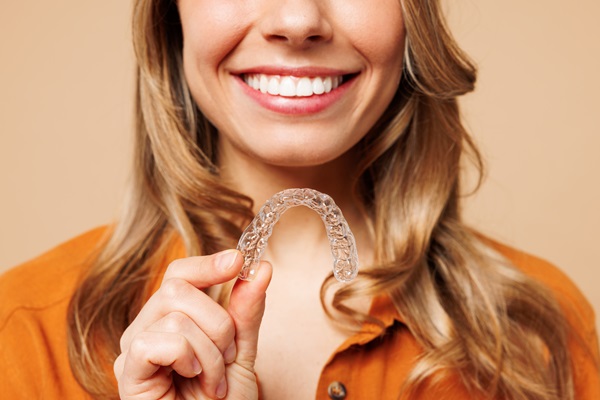Oral Hygiene Information During Invisalign Therapy from a General Dentist

The popularity of Invisalign® has grown as the treatment has proven to produce successful and positive results. Additionally, the treatment process is unlike any other. The actual process is a lot simpler than traditional approaches, and there are benefits that come with Invisalign® too.
One more important part of Invisalign® treatment is the need to remain disciplined with wearing the actual aligners. Because Invisalign® is removable, wearers are encouraged to keep the actual piece in for 22 hours a day. The only time the aligners should be removed is to eat and for oral hygiene. Keep reading to find out more.
Oral hygiene during Invisalign® treatment
Below is a quick overview of what one's oral hygiene routine should look like during the Invisalign® treatment process. This information may be helpful to those wearing Invisalign®.
Brushing
The most important oral hygiene tip to follow is to brush! Of course, this is crucial even outside of Invisalign® treatment. However, it is especially important during teeth straightening because the teeth are constantly shifting, thus resulting in changes in the mouth. Because of the shift that occurs during Invisalign®, the teeth may have more openings in small areas that can hold food debris. This puts the teeth and gums at risk of developing cavities.
General dentists recommend using a soft or medium-bristled toothbrush twice a day; however, after every meal is also highly recommended. When food debris is immediately removed, there is a lower chance that cavities will develop.
Flossing
Flossing is just as important as brushing, especially when undergoing Invisalign® treatment. Flossing keeps food debris away from the gums while also ensuring that the teeth stay in good shape too. Generally speaking, flossing can be done once a day; however, with Invisalign® treatment, it is best to do it after eating. The teeth become enclosed by the aligners immediately after eating, which is why flossing is important. Without flossing, any stuck food debris will have time to negatively impact the teeth and gums.
Rinsing
Rinsing is a big part of maintaining good oral hygiene during Invisalign® treatment. As stated earlier, the teeth and gums become immediately enclosed after eating. Rinsing the mouth after eating can be helpful in removing any excess food debris.
It may not be possible to brush and floss after eating every time, especially if the meal is at a restaurant or at a family member's home. Rinsing allows for some oral hygiene to be done until brushing and flossing can be done. Water is the best option as it clears the entire oral cavity and washes anything away without harming the teeth and gums, as soda or sugary beverages could.
Find out more about Invisalign®
It is important to follow the tips that are listed above when undergoing Invisalign® treatment. Without good oral hygiene, wearers put their oral health at risk, which can result in the need for restorative work while also undergoing Invisalign®. To learn more about Invisalign® and the requirements for oral hygiene, reach out today.
Request an appointment here: https://sunnyvale.mysmilecraft.com or call Smile Craft Dental at (650) 967-9900 for an appointment in our Sunnyvale office.
Check out what others are saying about our dental services on Yelp: Invisalign in Sunnyvale, CA.
Related Posts
Dental veneers can improve the shape, color, or symmetry of the smile in a way that looks natural. These thin restorations are bonded to the front of the teeth to enhance appearance while maintaining a natural feel. Available in both composite and porcelain materials, veneers are selected based on aesthetic goals, treatment timeline, and lifestyle.Composite…
An implant crown is made of strong and safe materials to give the patient a reliable long-term replacement option for missing teeth. If you have questions about the materials used to make an implant crown, this review can help you understand what exactly each component is made of and why dentists use these particular materials.There…
Oral health needs change as we age, and seeing a family dentist can play a big role in maintaining a healthy smile and boosting overall well-being. Family dentists are general dentists with the expertise to manage the unique dental challenges associated with aging. They provide personalized care that focuses on common and specific needs, ensuring…
Full mouth reconstruction refers to the comprehensive process of restoring or replacing all the teeth in the upper and lower jaws. Patients with extensive dental damage from decay, trauma, wear, or congenital conditions may benefit from this transformative treatment. While a full mouth reconstruction can significantly improve oral health, function, and aesthetics, understanding its advantages…
